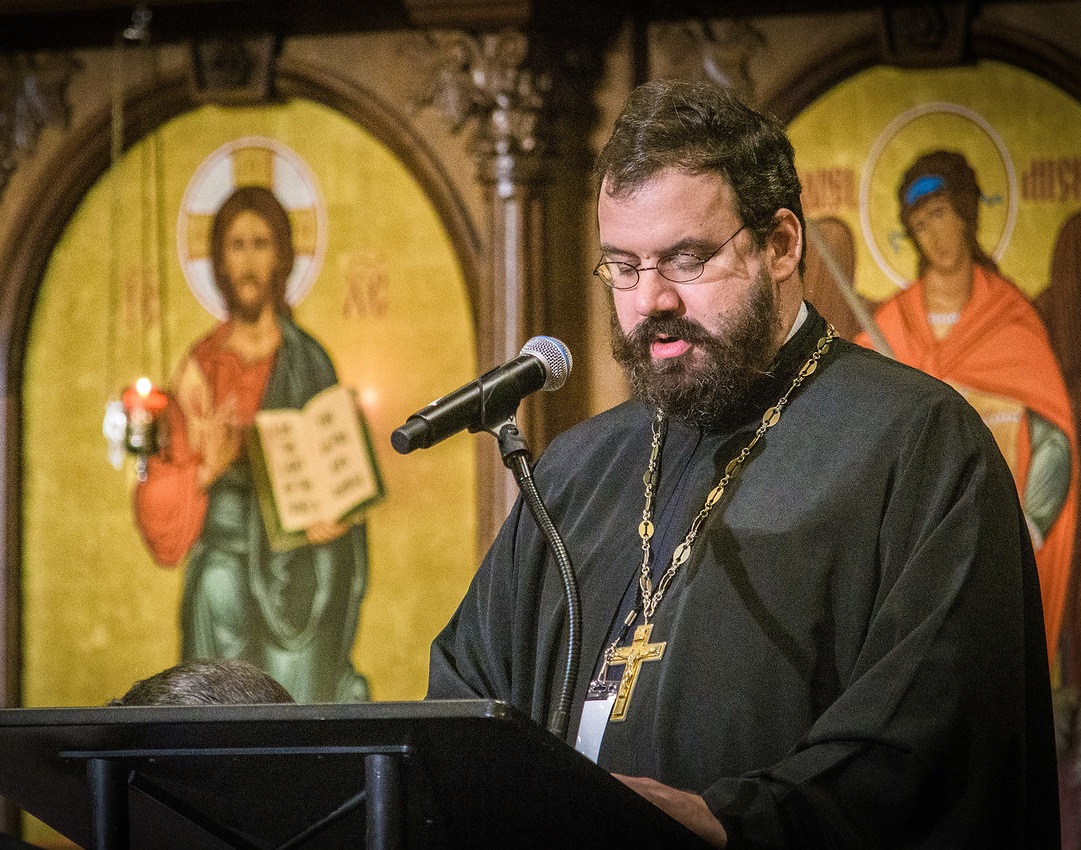19th AAC Highlights: Archpriest Serge Sollogoub reflects on the AAC
Throughout the course of the 19th All-American Council [AAC] of the Orthodox Church in America, held in Saint Louis, MO July 23-27, 2018, His Beatitude, Metropolitan Tikhon, welcomed and met with representatives of the Local Orthodox Churches that had accepted his invitation to attend the proceedings. Among those welcomed by Metropolitan Tikhon was Archpriest Serge Sollogoub, who represented the Ecumenical Patriarchate’s Exarchate for Orthodox Parishes of Russian Tradition in Western Europe and greeted the assembly on behalf of His Eminence, Archbishop John of Charioupolis, Exarch of the Ecumenical Patriarch.
In the September 2018 issue of the Exarchate’s publication, Feuillet de l’Exarchat, Father Serge shared his positive impressions of the 19th AAC in the article that appears below.
The Council of the Orthodox Church in America
by Archpriest Serge Sollogoub, Paris, France

I was privileged to participate in the 19th All-American Council as a representative of our diocese. The Council had brought together about 600 people in St. Louis, Missouri, from July 23 – 27. The theme of the Council was “For the Life of the World,” the title of a book by Father Alexander Schmemann, which served as a basis for a public reflection by the head of the Church, His Beatitude, Metropolitan Tikhon, entitled “Of What Life Do We Speak?: Four Pillars for the Fulfillment of the Apostolic Work of the Church.”
What surprised me first of all was the similarity in administration of the Orthodox Church in America, (who were given their autocephaly by the Council of Moscow,) and our diocese. We have the president of the Council and two vice presidents, elected by the Council, one priest and one layman. The composition of the Council is similar to our diocesan Assembly with clergy and elected laypeople from each parish, even if all are not represented.
But what struck me the most was the atmosphere of the Council, an atmosphere of joy in the church. Whole families came, the children had their own parallel programme, and we met for the offices as a family, the participants were pleased to meet up again and it was a very joyful moment. However, a suggestion to change the statutes of the reunion to meet every four years instead of every three was formally rejected by the assembly! This shows the importance the participants attach to their meeting together, even if some fear that the socializing takes over from the work that the Council has to accomplish.
The work of the Council is very similar to the work of our assemblies with an impressive number of reports, although some were in the form of videos to be less tedious. Two afternoons were dedicated to plenary sessions so the participants could discuss precise problems. There were six forums which were hosted by two bishops and a panel of experts. Everyone was allowed to express an opinion and the bishops could bring up any important points for discussion in the Synod. The titles of the forums were: Spiritual Life, How Can We Better Care For Our Clergy, How Do We Properly Steward What God Has Entrusted To Us, Our Relations with Others, Evangelization and Missions and Evangelization among Our Parishioners.
The liturgical life of the Council started with a Liturgy at 6:00 in the morning, celebrated by different members of the clergy and sung by a choir under the direction of a different choir leader each time. After the Liturgy there was an akathist in front of one of the miraculous icons which had been brought to the Council. The akathist before the icon of the Virgin of Sitka celebrated by the Bishop of Alaska and surrounded by members of his clergy was particularly memorable. Vespers in the evening were followed by a homily.
One incident which was particularly moving was the blessing at the end of the episcopal Liturgy of a family who were leaving to be missionaries in South Korea, witnessing not only to the universality of the Church but also the dynamism of the Orthodox Church in America.
The life of the Orthodox Church in America shows the strength which the Orthodox Church in Europe could have if we were capable of uniting and putting all our strength to the service of Christ, our neighbour and the life of the world. Admittedly the canonical situation is not regulated but nevertheless there is a dynamism which is unequaled with America participating more than all other dioceses in the pan-Orthodox organs (Mission, humanitarian aid, prison chaplains…).
